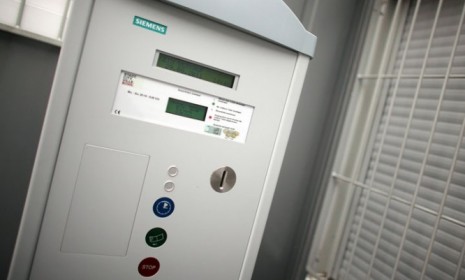Germany's 'remarkable' prostitution tax meter
Forget the meter maid. One German city unveils the meter madam, requiring a prostitute to put money in a machine before plying her trade

A free daily email with the biggest news stories of the day – and the best features from TheWeek.com
You are now subscribed
Your newsletter sign-up was successful
Prostitution is legal in Germany. It's also taxable. While it's fairly easy to collect a "sex tax" from brothels, "sauna clubs," and other sex purveying establishments, it's trickier to make sure freelance streetwalkers pay up. The city of Bonn has a solution: An automated street meter where prostitutes pay a nightly fee to ply their trade. The converted parking meters, which went into effect Monday, are expected to raise about $285,000 a year. How do they work? Here, a brief guide:
How do the meters work?
Each night before work, prostitutes are required to buy a ticket for about $9 from one of the meters, which are being set up in areas used by sex workers and their customers. That buys the prostitute a day of legal work time, regardless of the number of clients. Prostitution is only legal in Bonn between 8:15 p.m. and 6 a.m.
The Week
Escape your echo chamber. Get the facts behind the news, plus analysis from multiple perspectives.

Sign up for The Week's Free Newsletters
From our morning news briefing to a weekly Good News Newsletter, get the best of The Week delivered directly to your inbox.
From our morning news briefing to a weekly Good News Newsletter, get the best of The Week delivered directly to your inbox.
What's the punishment for failing to pay?
First time sex-tax dodgers will get a warning. Subsequent violations merit a fine (about $125) or even a ban from working in the sex trade. After the first night of use, a single meter yielded roughly $375. Bonn has about 200 working prostitutes, with an average of 20 walking the streets on any given night.
Is the tax controversial?
Freelance sex workers aren't happy. Juanita Rosina Henning of prostitute support group Dona Carmen says the meters amount to double taxation, since prostitutes already pay income tax. Bonn is casting the meters as a fairness measure that puts streetwalkers on an even tax footing with sex workers in fixed establishments. Henning disagrees: "This has nothing to do with fiscal equality."
A free daily email with the biggest news stories of the day – and the best features from TheWeek.com
Is prostitution controversial?
It has been legal in German since 2002, and the biggest complaint has reportedly been about prostitutes having sex with clients on residential streets — and even in people's yards. Bonn dealt with that by establishing prostitution zones on the outskirts of the city, and even constructing "consummation areas" — six garage-like wooden boxes for drive-up johns to park in during their assignations, complete with an alarm for the prostitutes if things get too rough.
Will this plan have any effect on prostitution?
Some commentators think so. That's what's so "remarkable" about the system, says Ryan Avent in The Economist. In "normal markets," we'd expect taxation to decrease a service. But there's also the real chance the sex meters could increase prostitution "by regularizing the system." Either way, kudos to the Germans: "Would sex workers in other countries pay on the honor system this readily?"
Sources: AFP, BBC News, Business Insider, CBC News, CNN, Daily Telegraph, Der Spiegel, Economist, The Local
-
 ‘Poor time management isn’t just an inconvenience’
‘Poor time management isn’t just an inconvenience’Instant Opinion Opinion, comment and editorials of the day
-
 Bad Bunny’s Super Bowl: A win for unity
Bad Bunny’s Super Bowl: A win for unityFeature The global superstar's halftime show was a celebration for everyone to enjoy
-
 Book reviews: ‘Bonfire of the Murdochs’ and ‘The Typewriter and the Guillotine’
Book reviews: ‘Bonfire of the Murdochs’ and ‘The Typewriter and the Guillotine’Feature New insights into the Murdoch family’s turmoil and a renowned journalist’s time in pre-World War II Paris